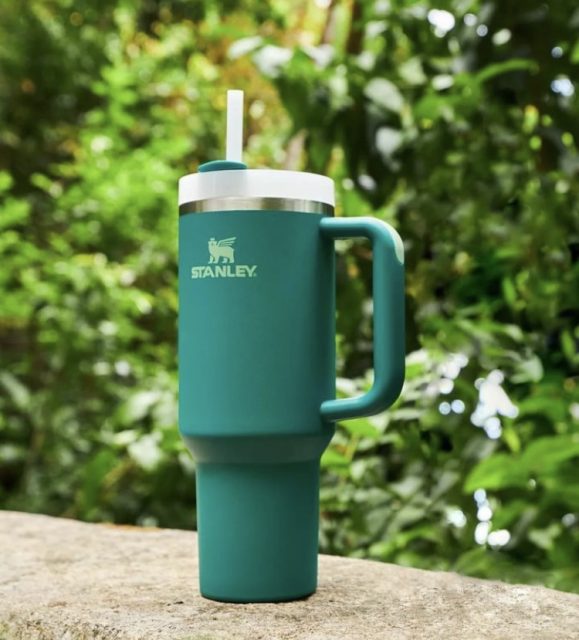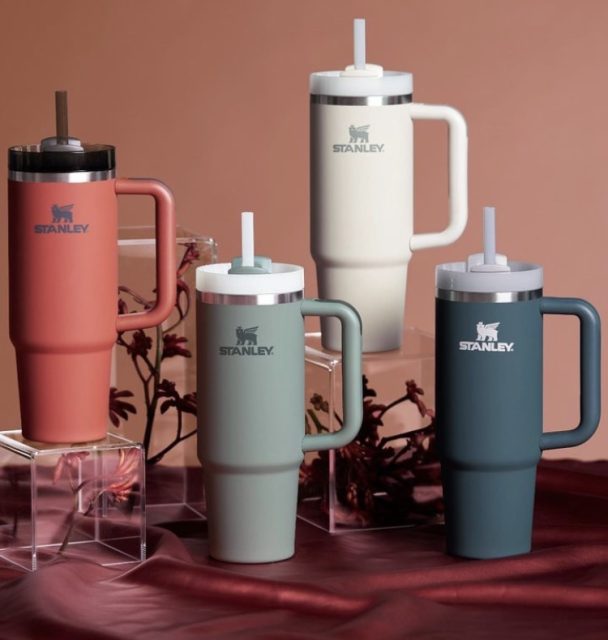Can you store alcohol in a Stanley drinking cup?
By Sarah NeishThe Stanley drinking cup craze shows no sign of abating. But can you safely keep booze in one? db investigates the all-important question.

Not having a Stanley Quencher on your office desk or next to your spin bike in 2024 is the equivalent of not owning a Soda Stream in the ’90s.
The elite drinking cup has blown up, with the #StanleyCup hashtag racking up more than seven billion views on TikTok and everyone from teens to retirees carting the enormous vessels around as they go about their daily chores.
Fans are even turning to crime to capitalise on the drinking cup’s popularity. This week, a woman in northern California was arrested for stealing 65 Stanley cups from a store in Roseville.
“While Stanley Quenchers are all the rage, we strongly advise against turning to crime to fulfil your hydration habits,” police said in a statement made at the scene of the arrest after uncovering US$2,500 worth of Stanley cups concealed in the culprit’s car.
The Quencher cup, which holds 40 fluid oz and retails on the Stanley website for US$45, is widely used to hold water as part of what critics are calling “performative hydration”. But can you use them to store alcoholic beverages?

Which drinks make the cup?
According to water treatment technician Paul Burkhardt, author of the H20 Bottle Guy blog, which interrogates the properties of different water bottles, the stainless steel Stanley cups are “structurally rugged enough to contain most standard alcoholic varieties including wine, beer, cider and distilled spirits”.
Stanley’s “excellent insulating properties”, Burkhardt says, will ensure your booze stays chilled “for hours”.
However, Burkhardt cautions that over time alcohol may have “a degrading effect” on the bottle’s seal materials, and could “warp” the plastic lid. “High-proof liquors and extensive long-term alcohol exposure may slowly damage lid seals, O-rings and plastic components over years of use,” he says.
For transporting beer or cider, most Stanley cups will do the trick adequately, but for denser stouts or wheat beers which tend to give more froth, he recommends choosing a Stanley product with a wider mouth to allow for expansion.
Depending on the size of your Stanley cup, it can potentially store “an entire bottle of wine”, says Burkhardt (some Stanleys hold in excess of 64oz), though it’s wise to avoid sweet, sticky dessert wines which may stain the inside of the bottle. The stainless steel’s nonporous, neutral properties “preserve the flavour of wines beautifully”, and in some cases “better than glass”, he claims.
Partner Content
Burkhardt recommends storing white wine in a Stanley cup for no more than five to seven days, and red wine for three to five days.
If you’re planning on stashing Champagne or sparkling wine in your Stanley cup, it’s worth looking for reinforced models designed to handle greater carbonation. Fizz requires “special care in Stanley bottles” due to the sensitivity of carbonation, but shorter-duration transport in a “foam-friendly wide-mouth Stanley is definitely doable”, says Burkhardt, providing that you consume the sparkling wine quickly after filling “for maximum freshness and effervescence”, and avoid “vigorous shaking”.
Having trialled high-proof liquors “including spiced rums, Tequila and flavoured vodkas”, he gives the Stanley cup the thumbs up, but advises drinkers to “ensure the bottle is cleaned thoroughly before and after to avoid flavour transfer”.
In the US, where having an open container of alcohol in public places is prohibited in most states, vessels such as the Stanley cup are being put to use during tailgates, beach parties and park meet-ups.
During the Covid-19 pandemic, people sneaked booze into pubs and public spaces by hiding it in hand sanitiser bottles.
It has also been reported by db that one man got around forking out for expensive drinks at a Chicago festival by digging up a bottle of vodka he had buried weeks before.
Related news
Should Rioja increase its focus on white wine?
The 'family spirit' behind Champagne Gardet's 130th anniversary




